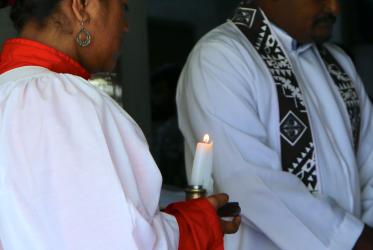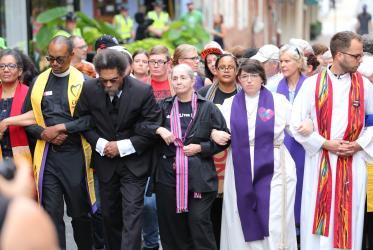Geneva, 7-9 September 2006
Challenges and the way forward
Background
-
This report presents the key challenges and issues as well as proposals for the way forward in the World Council of Churches' (WCC) AGAPE process. The latter essentially serves as a programmatic guide for the WCC's continuing work on AGAPE as well as helps to identify areas where and/or ways in which WCC's ecumenical partners can engage more meaningfully in the process.
-
The 9th Assembly of the WCC in Porto Alegre, Brazil, by way of the report of the Programme Guidelines Committee, affirmed the AGAPE process and recommended that a follow-up be undertaken and expanded in collaboration with ecumenical partners and organisations.
-
Thus 33 of us representatives from churches, specialised ministries, communions and non-government organisations participated in a workshop organised by the WCC on "Deepening the AGAPE Process and Follow-up" from 7-9 September 2006 in Geneva, Switzerland with the following objectives:
-
To share perspectives and develop proposals on how to deepen the theological, economic, political, social and cultural aspects of the AGAPE process; and
-
To suggest new ways of sharing practical and positive approaches from churches on the way forward, including on how to co-ordinate these approaches with partners.
-
-
The workshop is considered as an initial step in deepening the AGAPE process, which will be followed up more thoroughly and systematically in WCC's programmatic work.
Key challenges and issues
-
It has to be acknowledged that there continue to be differing perspectives around the AGAPE process as well as differing interpretations of key political, economic and ecumenical concepts. This is due in large part to our different social and historical locations and contexts. Such tensions, however, are an intrinsic part of any process for transformation, pointing to the pressing need to find new synergies for our common actions. These can be developed only if experiences from different parts of the globe are taken into account and respected. A deepened culture of listening will ensure that the Agape process is inclusive and is an honest search for justice and dignity for all.
-
However, we have to keep in mind that we need to foster a spirituality of radical solidarity with the victims of socio-economic injustice as well as those who are courageously resisting injustice. Such solidarity is crucial in helping to conquer many of the fears that paralyze us as well as in initiating a process of healing of old and new pains.
-
Deepening the theological reflection on AGAPE is paramount especially in our ongoing search for alternatives. Resources and particular contributions of all churches and denominations will be studied and used in the process.
-
Thus far, the process has developed a critique of neo-liberal globalization which, driven by competition and profit motives, has had disproportionately negative impacts on the most vulnerable sectors of society: the poor, women, Indigenous Peoples and people with disabilities in particular. While critical analysis of the current political and economic order is a continuing task, much more attention and energy must be given to building, supporting and lifting up alternatives while recognizing that transformation is a process that need not be defined by a clear end-state.
-
In discussing and thinking more concretely on economic systems, the WCC and its ecumenical partners are not limited to lessons learned from past systems, i.e. capitalist, socialist or totalitarian models. Critique of all these models must open up to other approaches (e.g. feminist and ecological thought) that offer rich insights.
-
Rather than presenting a "blueprint" for transformation, the process must develop a standpoint on globalization as well as an alternative vision or framework based on shared Biblical and theological criteria while affirming the diversity of experiences and contexts in order to counteract the neo-liberal assumption that there is a "one size fits all" model for organizing economic development.
-
Much inspiration can also be drawn from numerous transformative elements that are already operating, especially at the grassroots level, but also at the national and global levels, both in the South and North. These must be identified, celebrated and reproduced.
-
Especially in the current era of heightened religious fundamentalism, the AGAPE process has to take strong cognizance of the inter-religious context we live in.
-
Aside from deepening the work on trade and debt, it must also take on relatively neglected yet critical issues that are strongly linked with economic aspects of globalisation such as:
-
Ecology - especially land and water
-
Migration and multi-cultural societies;
-
Consumerism, profit and greed;
-
Governance
-
The role of media.
-
-
Finally, what is clear is that economic analyses in the globalization discourse have to be complemented by political analyses, i.e. a deeper interrogation of power (e.g. economic, military, cultural, technological and imperial) and the ways in which it manifests itself within the context of global interdependence. More specifically, the growing convergence between neo-conservatism, neo-liberalism and religious fundamentalism and its reverberations on society and implications for the life and work of churches have to be probed further. In relation to this, the roles of our own governments, our churches and/or church-related agencies as well as ourselves in supporting systems of domination and exploitation at various levels have to be critically examined.
The way forward
-
The issues and challenges linked to AGAPE are multidimensional and multifaceted, challenging us to think globally and act locally as well as to think locally and act globally.
-
As a starting point, there is a necessity for genuinely open and critical dialogues on globalization within and among churches and ecumenical partners in the South, North, East and West, between Christian churches and various religions and faiths, and between churches, social movements and civil society organizations. While building on commonalities and respecting the diversity of views, these dialogues cannot shy away from discussing the systemic root causes of socio-economic injustice in our world today nor ignore churches' complicity in perpetuating these injustices.
-
In deepening our theological reflection and building solidarity among churches and church people on AGAPE issues, "insertion" or "immersion" in contexts of injustice is a key methodology that cannot be over-emphasized. In this connection, linkages with social and grassroots movements (e.g. peasant, labour and youth groups) have to be doubly strengthened for instance through the World Social Forum and other fora and programmes.
-
Building critical awareness of AGAPE issues among church leaders, congregations and seminaries remains a central task. In this regard, churches and church-based agencies have developed plentiful educational materials that are grounded in local contexts and communities as well as use creative yet familiar and accessible language. These materials have to be shared more effectively.
-
The WCC in particular must:
-
In light of growing convergence between economic globalisation and militarisation, intentionally and visibly connect the AGAPE process with the Decade to Overcome Violence international peace convocation and declaration, as recommended by the WCC Central Committee meeting in Geneva in September 2006;
-
Articulate a strong theological basis as well as bible study materials on the AGAPE economy
-
Theological institutes as well as the Bossey Ecumenical Institute need to open regular courses on faith and economy/ecology
-
The AGAPE process should be considerably focused on the search for alternatives
-
Conduct regional hearings on the AGAPE follow-up with participation from delegations of US and European churches as well as women, youth, indigenous peoples, and persons with disability;
-
Initiate studies and dialogues on (a) the neo-conservatism-neo-liberalism-religious fundamentalism triangle, deliberately bringing in inter-religious voices, as well as on (b) land and water issues, (c) migration and multi-cultural societies, (d) consumerism, profit and greed, and (e) governance;
-
Collect stories and best-practices of resistance and alternatives especially from women, indigenous peoples and persons with disabilities;
-
Construct and coordinate a Web page on AGAPE, with strong youth involvement. Among others, the Web page will foster communication, collect educational materials and Bible studies reflecting on churches' role in justice and peace concerns as well as help to initiate a prayer network on AGAPE;
-
Facilitate the formation and support of AGAPE chapters or working groups in different regions of the world that will help ensure progress on each of the seven areas of action of the AGAPE call in those regions. The WCC will play an important role in coordinating the efforts and information sharing among these groups .
-
Undertake a review and follow up of the WCC El Escorial Conference on sharing of church resources; and
-
Deepen work with the World Alliance of Reformed Churches, Lutheran World Federation, regional ecumenical organisations, the Ecumenical Advocacy Alliance and church-based agencies on various activities on AGAPE concerns.
-
22nd September 2006


